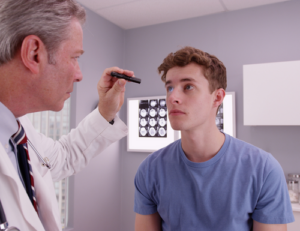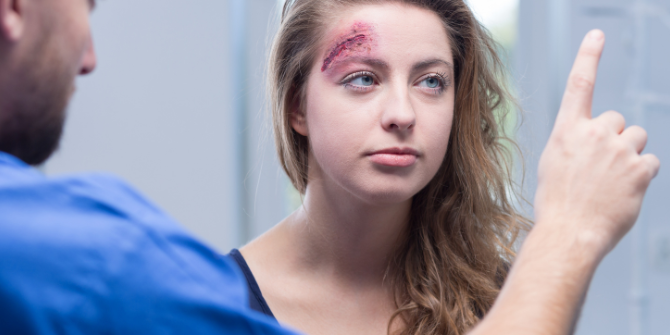Not every blow to the head requires a trip to the nearest emergency room or urgent care in Oxnard, CA. Sometimes what appears to be a minor bump to the head is a more serious head injury known as a concussion. Concussions are a type of mild traumatic brain injury (TBI) that often occur as a result of a blow or jolt to the head, face, or neck or a hit to the body that causes the head and brain to move rapidly back and forth. They are typically not life-threatening but can significantly affect one’s physical, cognitive, and emotional health.
Concussions are quite common and not as easy to manage without proper medical care. To better understand the importance of seeing an urgent care doctor for treatment, continue reading to learn the symptoms of concussions.
Symptoms of a Concussion
Concussion symptoms vary widely and may include headache, dizziness, confusion, memory loss, sensitivity to light and noise, nausea or vomiting, fatigue, and changes in mood or behavior. Symptoms may appear immediately after the injury or may not develop until several days later.
Some of the most common symptoms of a concussion include:
- Headache or pressure in the head
- Dizziness or balance problems
- Nausea or vomiting
- Sensitivity to light or noise
- Blurred or double vision
- Slowed reaction time
- Confusion or feeling foggy
- Memory problems or forgetfulness
- Trouble concentrating
- Changes in sleep patterns
- Irritability, mood swings, or depression
- Anxiety or nervousness
It’s important to note that symptoms of a concussion can appear immediately after the injury or may develop gradually over a period of hours or days. If you suspect that you or someone else has a concussion, it’s important to seek medical attention immediately. A healthcare professional can perform tests and assessments to diagnose and manage the injury, including rest, medication, cognitive and physical therapy, and gradually return to normal activities.
Concussion Warning Signs to Watch for
While most concussions resolve on their own within a few days to a few weeks, the symptoms can worsen in some cases. If you or someone you know has suffered a concussion, it’s important to monitor the symptoms closely and seek medical attention if they appear to be getting worse.
Some signs of a concussion getting worse include:
- Increasing headache or head pressure
- Continued or increasing nausea or vomiting
- Worsening balance or coordination problems
- Increasing confusion or disorientation
- Increasing irritability, mood swings, or depression
- Increasing sensitivity to light or noise
- Difficulty waking up or staying awake
- Seizures or convulsions
- Weakness or numbness in the arms or legs
- Slurred speech or difficulty speaking or understanding speech
If you notice any of these signs or symptoms, it’s important to seek medical attention immediately. A healthcare professional can perform tests and assessments to diagnose and manage the injury, including rest, medication, cognitive and physical therapy, and gradually return to normal activities. In some cases, more severe concussions may require hospitalization or other specialized treatment.
How to Manage Concussions at Home
If you have been diagnosed with a concussion and your healthcare provider has advised you to manage your symptoms at home, there are several steps you can take to help your recovery. Here are some tips on how to manage concussions at home:
Get plenty of rest: Rest is crucial for concussion recovery. Try to avoid activities that require a lot of physical or mental exertion, and get plenty of sleep.
Avoid screens and bright lights: Screens and bright lights can worsen concussion symptoms, so try to avoid them as much as possible. This includes televisions, computers, smartphones, and other devices.
Use pain relief medications: Over-the-counter pain relief medications, such as acetaminophen or ibuprofen, can help relieve headaches or other pain symptoms. However, check with your healthcare provider before taking any medications.
Stay hydrated: Drink plenty of fluids to stay hydrated. Dehydration can worsen concussion symptoms.
Gradually resume normal activities: Once symptoms improve, you can gradually resume your normal activities. However, avoid activities that could put you at risk of another head injury.
Follow your healthcare provider’s instructions: Follow any instructions or restrictions given to you by your healthcare provider, and attend any follow-up appointments as scheduled.
Remember, concussion symptoms can take time to fully resolve, so be patient with yourself and give your body the time it needs to heal. If you notice any worsening symptoms, contact your healthcare provider right away.
When to See Urgent Care Doctor for Concussion

It’s important to seek medical attention for a concussion as soon as possible, as early diagnosis and treatment can help to minimize the risk of long-term complications. Urgent care doctors can perform tests and assessments to diagnose and manage the injury, which may include rest, medication, cognitive and physical therapy, and a gradual return to normal activities. In some cases, more severe concussions may require hospitalization or other specialized treatment.
If you or someone you know has suffered a head injury and is experiencing any symptoms of a concussion, it’s important to seek medical attention right away. If the symptoms are severe or if there is a loss of consciousness, call 911 or go to the nearest emergency room immediately.
How Urgent Care Treats Concussions
Urgent care centers can provide initial evaluation and treatment for concussions, but severe or complicated cases may be referred to a specialist. Here are some ways in which an urgent care center might treat a concussion:
Evaluation: The healthcare provider will evaluate the patient’s symptoms and medical history, and perform a physical exam, including a neurological exam, to assess the patient’s brain function.
Imaging tests: In some cases, the healthcare provider may order imaging tests, such as a CT scan or MRI, to check for any structural damage to the brain.
Medications: The healthcare provider may prescribe medication to manage symptoms, such as pain or nausea.
Rest and observation: The most common treatment for concussions is rest and observation. The patient may be advised to rest in a quiet, dark room, avoid activities that could worsen symptoms, and gradually resume normal activities as symptoms improve.
Follow-up care: The healthcare provider may schedule a follow-up appointment to monitor the patient’s progress and adjust the treatment plan as needed.
Referral to a specialist: In some cases, the healthcare provider may refer the patient to a specialist, such as a neurologist or sports medicine physician, for further evaluation and treatment.
It’s important to seek medical attention for a concussion as soon as possible, as early diagnosis and treatment can help to minimize the risk of long-term complications.
If you suspect you have a mild head injury or concussion, head to the nearest Solar Urgent Care facility for immediate medical attention.








